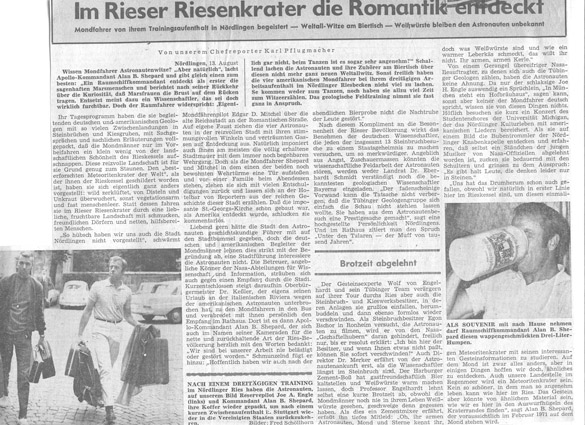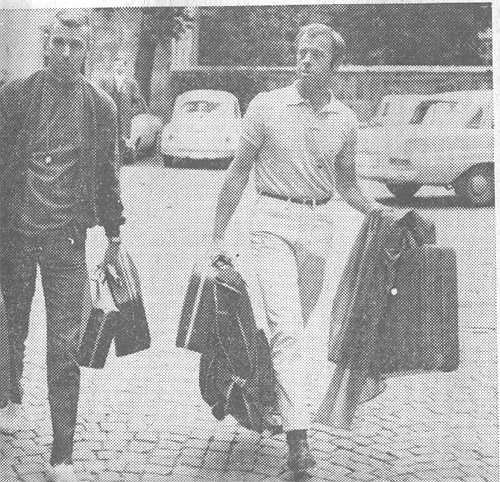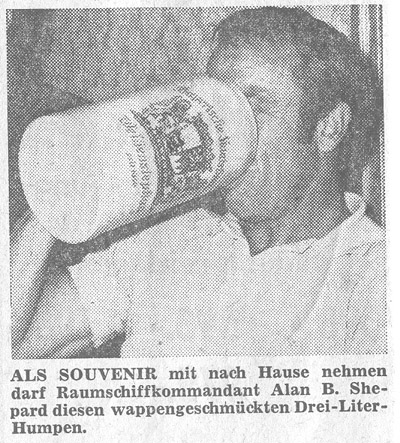
Apollo 14 Field Trip - News Article 3
Published 13 August 1970 in the Augsburger Allgemeine. Used with permission.
Scan and German-to-English translation by Klaus Zeitner.

Click on the image for a larger version.
______
They've Discovered Romance in the Giant Ries-Crater
Moon-flyers are enthusiastic about their training in Nördlingen - Space jokes at the beer table - Weißwürste (Note 1 below) remain unknown to the astronauts
from our chief-reporter Karl Pflugmacher
Nördlingen, August 13
Do moon-flyers know astronaut's jokes? "But of course", Apollo-commander Alan B. Shepard laughs and adds: "A spacecraft commander discovers the legendary Mars people for the first time. Following his return to Earth he is talking about the curiosity, that Mars-women do have their breasts on their back. A horrified scientist remarks that this should really be awful. The spaceman, however, opposes: Well, not so. It can be even very pleasant when dancing." The astronauts and their listeners at the beer table are laughing warmly about this not so new space-joke. On the other hand, the four American astronauts don't have much to laugh about during their three-day stay in the Ries basin of Nördlingen. They neither have much time for dancing nor for telling jokes. They are almost totally involved in their geological field training.
The accompanying German and American geologists have packed their daily tasks with so many stops in quarries or gravel pits, filled with technical and scientific explanations, that the moon men can barely notice the beauty of the Ries basin when passing through. This remarkable landscape is reason enough for their astonishment. They were thinking of "the best explored meteor-crater in the world (Note 2 below) is " totally differently: wildly cleft, overgrown with thistles and weed, lacking much vegetation and settlements. Contrary to that, (at Ries) they are riding through a delightful and fertile region with pretty and friendly villages and nice cooperative people.
"We didn't think the city of Nördlingen would be that pretty", says lunar module pilot Edgar E. Mitchell passionately about the former Reichsstadt (Note 3 below) on the Romantic Road (Note 4 below). The four astronauts explore the city with its atmospheric corners and romantic alleys on their own. Naturally they are enormously impressed by the completely preserved city wall and its defense-way which can still be walked on. But once the moon-flyers Shepard and Mitchell open a door of one of the two still inhabited wall towers and are standing in front of a family just having supper, they politely retire murmuring lots of excuses. In the lobby of their hotel, reporters tell them stories of this city's rich past. Without commentary they notice that the imposing St George's Church had already been built when America was just discovered.
The city would love to have offered a history-guide to the astronauts, but the German and American companions strictly objected, saying, the astronauts are not interested in a guided tour of the city. The responsible persons, so-called experts of the science and information department of NASA, also reject an official reception by the city. Mayor Dr. Kessler - having interrupted his vacation on the Italian Riviera because of the astronauts - without a moment's hesitation mounts the coach (bus) of the astronauts and personally arranges a meeting in the city hall. It is Apollo commander Alan B. Shepard who thanks (the Mayor) in the name of all of his comrades for the nice and cautious attitude of the Ries population: "During our work we've never been bothered or disturbed." He smilingly adds: " I hope we didn't disturb the silence of the night after our beer-tests."
Regarding this compliment to the deliberation of the inhabitants of the Ries, the attitude of the German scientists seems to be bewildering, as they tried to keep every visit to the thirteen different quarries as a secret. Fearing that masses of onlookers might disturb the scientific work of the astronauts, Landrat (Note 5 below) Dr. Eberhardt Schmidt is not informed nor are the best-known Bavarian geological scientists invited. "The flimsy pretext cannot hide the fact that the group of geologists from Tübingen didn't want to have their show stolen. "They've made the visit of the astronauts to a matter of prestige", says one high-ranking personality of Nördlingen. And in the City Hall an old saying is recited: "Under the robe - the musty smell of a thousand years" (Note 6 below)

Following three days of training in the Nürdlingen Ries, the astronauts - backup pilot Joe A. Engle (left) and Commander Alan B. Shepard - have packed their baggage in order to return to the United States following a short stopover in Stuttgart
Brotzeit rejected
Mineralogic expert Wolf von Engelhardt and his Tübingen team also annoys the owners of quarries and gravel pits, when suddenly appearing without saying one word, digging around, and disappearing. When quarry-owner Egon Bschor from Ronheim tried to film the astronauts, he was hindered by NASA "Gschaftelhubern" (Note 7 below), but only until he resolutely declares: " I am the owner here, and if you don't like it you can leave immediately!" (Harburg Quarry) Director Dr. Merker also learns of the presence of the astronauts only when the scientists have already arrived in his quarry. The cement-boss (Note 8 below) of Harburg had reserved cool beer and warm Weißwurst, but professor Engelhardt rejects even a short Brotzeit, ignoring the fact that the astronauts had never before seen a Weißwurst, let alone eaten one. The cement-mixer (Note 8a below), realizing this, is filled with deep sorrow for the astronauts: "Oh you poor astronauts, you may know the moon and the stars, but you don't know what Weißwürste are and don't know the taste of Leberkäs (Note 9 below). Poor, poor guys!"
The astronauts, however, have no knowledge of all this quarrel caused by some eager responsibles of NASA and the geologists from Tübingen. They don't know anything about these things as none of the moon-flyers speaks German with the exception of Joe H. Engle who recites one sentence by heart : "In München steht ein Hofbräuhaus". (Note 10 below) Politely they attend a concert of the student's choir of Michigan University, who enrich the cultural life of Nördlingen with American songs. On a picture they discover a young drummer-boy of the Nördlingen youth music band and have to realize that even a short performance by the young musicians was rejected by NASA-officials. Shrugging their shoulders they regret smiling : "Well, there are people who only think in stones."
Alan B. Shepard, who will stand on the Moon presumably in February 1971, says: "We also liked all the other things around our work (meaning the after-hours, social activities: see Note 11 below), not forgetting the fact that we are here in the Ries depression to study this unique meteor-crater and its interesting rock formations. On the Moon, everything will be different, but we hope to find some similarities. Our landing site in the Ocean of Storms will also be an impact crater. Not as beautiful as the Ries, where you can live pleasantly. The rocks, however, may be of the same material like the ones found in these rims of this crater."

Spacecraft commander Alan B. Shepard may keep this three-liter-sized mug - decorated with coats of arms - as a souvenir. (Note 12 below)
______
Notes:
(1) "Weißwurst" (plural: WeißwŸrste) - "white sausage". A Bavarian speciality! Made of squashed meat and spices and stuffed into white intestines; therefore its name. It is cooked in hot water, and eaten with sweet mustard and pretzels.
(2) The description matches Meteor Crater in Arizona.
(3) "Reichsstadt" - "City of the Empire", title given to a city. In the "Holy Roman Empire of German Nation" up until the Napoleonic times a Reichsstadt possessed a great amount of independence.
(4) The "Romantic Road" is a scenic tourist-road through Bavaria.
(5) "Landrat" - elected political chief of a district.
(6) Meaning that some officials still hold on to some old-fashioned attitude.
(7) Original word in text "Gschaftlhuber" (G-SHUFF tel hoo ber) is a Bavarian slang-word meaning a person who doesn't have the authority but behaves like such one.
(8) Merker - Name of the boss of a big enterprise the same name in the city of Harburg, producing cement.
(8a) cement-mixer - A funny word. Not the machine, but again the boss of the enterprise is meant.
(9) "LeberkŠs" - ("Liver cheese") Name of a Bavarian sausage/meat speciality. Has absolutely nothing to do with "liver" and/or "cheese". Very difficult to explain. Maybe that way: take the interior of a bar-b-q sausage, but far more fine, almost "cream"-like, baked in the oven in the form and size of a loaf of bread. Anyway, it's delicious !
(10) "There's the Hofbräuhaus in Munich" - First line of a popular beer song in Bavaria "honoring" the world-famous Hofbräu-brewery in Munich.
(11) The term "drumherum" refers to all the things for relaxation that had nothing to do with the geology training.
(12) Despite the bad quality of the picture, I was able to find out that the mug carries the coat of arms of the State of Bavaria and the inscription "Bayerische Staatsbrauerei Weihenstephan - seit 1040", which means "State Brewery of Bavaria, "Weihenstephan" - since 1040". Weihenstephan (WHYen STE fun) - near Munich, is the world's oldest brewery, founded in AD 1040.



